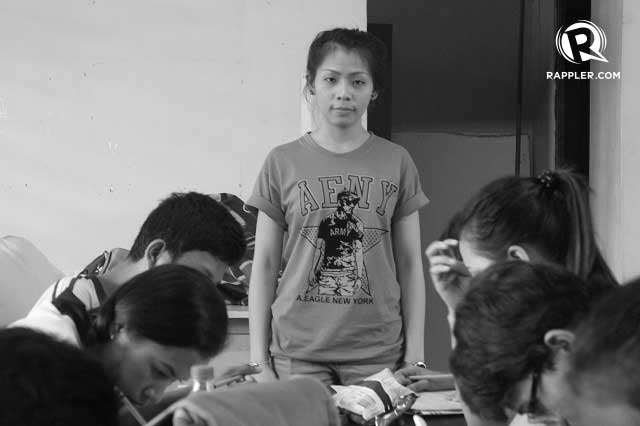SUMMARY
This is AI generated summarization, which may have errors. For context, always refer to the full article.

MANILA, Philippines – In a sea of high school freshmen, Almira stood out. She was 17 when everyone else was 13 – for no special reason other than she started attending school later than usual.
Back in elementary, the age difference did not matter. But high school proved to be a harsher learning environment, where the younger ones bullied the ate of the class.
Almira stopped school and wiped tables in a Korean restaurant instead.
Her childhood dream was to be a tour guide, to travel around the world, including Korea. For two years, she did most of her traveling in daydream, as she whispered to herself often: Wala nang mangyayari sa buhay ko. (Nothing’s going to happen to my life now.)
It was a dying dream until she heard about the Alternative Learning System (ALS) from her uncle. She immediately quit the job, enrolled in a Quezon City ALS center and vowed she’d get back on track.
Staying in college
She graduated a year after. Among her batch of 10 learners, she was the only one bent to pursue higher education.
Now a Tourism freshman of the Philippine Women’s University, Almira admits college is tough. But she’s coping, hoping she lasts until graduation. After all, she’ll do anything to see the world someday.
READ: Who’s excited about Saturday school?
ALS division supervisor Dr Diosdado Medina says many ALS graduates want to go to college – even going through a bridging program for preparation – but not all colleges are ready for them.
“Pagdating sa college, meron nang Math, meron nang Physics. Di naman sila natrain dun. Na-trauma. Sabi nga ng mga university, nakakatapos nga sa inyo, pagdating naman sa amin nagda-drop out,” Medina observes.
(In college, subjects like Math and Physics are already included. [ALS students] were not trained with those. They become traumatized. Universities would say ‘they do finish in ALS, but they eventually drop out in college’.)
Real world
“Once they decide to go higher, then they face the real world,” Margie Ballesteros of the Commission on Higher Education (CHED)’s Division Of Non-Conventional Higher Education Program said.
Unlike in ALS where competencies serve as the barometer, higher education is for those tough enough to endure.
“Not all could go to college. You may be very rich and you want to go to university but you’re not mentally and emotionally ready for that…there is no other coping mechanisms for us to give them,” Ballesteros says in a mix of English and Filipino.
There may be no coping mechanisms in place, but alternatives are also available in higher education. Ballesteros says the ladderized program fits ALS graduates.
More choices
In 2004, President Gloria Macapagal Arroyo signed Executive Order 358 institutionalizing the Ladderized Education Program (LEP).
Since then, more than 17,000 ladderized programs have been put up all over the country.
The program allows a student to exit after a semester or year with a certificate in hand, and qualifications fit for a particular exit job. The student may continue and finish the degree later on.
The House of Representatives’ committee on higher and technical education approved on September 11 this year the Ladderized Education Bill, a measure that seeks to strengthen the ladderized interface between technical-vocational education and higher education.
Committee chair Roman Romulo says the bill is envisioned to solve the problem of skills-job mismatch “where the qualifications of college graduates do not meet the skills required by the industry.”
If ALS in basic education is geared towards meeting the learner’s needs, Ballesteros says non-conventional programs in higher education is for self-actualization.
“[The availability of these programs] will not stop you from learning, to be able to finish a degree – maybe not now, but in the future,” she said. – Rappler.com
Add a comment
How does this make you feel?
There are no comments yet. Add your comment to start the conversation.